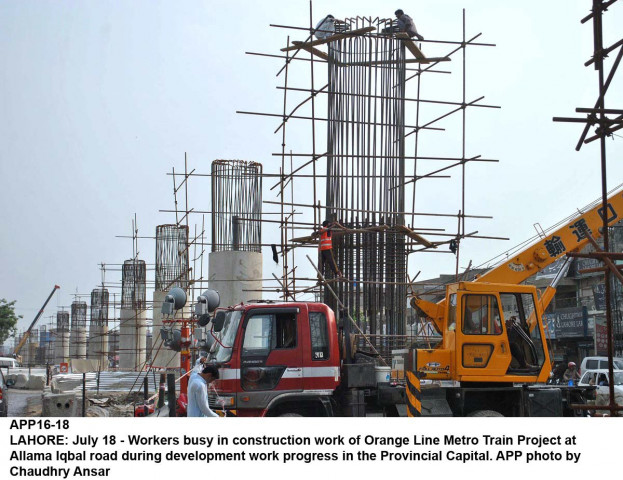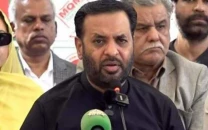Development budget to take hit from cuts
Finance ministry proposes budget of Rs800b, one-fifth less than allocated for PSDP this year

PHOTO: APP
The finance ministry on Thursday formally informed the Ministry of Planning, Development and Reform about its intentions to allocate Rs800 billion for fiscal year 2018-19, said sources in the ministry. The amount is Rs201 billion or 20% less than the budget for the current fiscal year 2017-18 that is ending on June 30.
The indicative PSDP ceiling for fiscal year 2018-19 is in line with the Adviser to Prime Minister on Finance's recent announcement. Dr Miftah Ismail had said that the PML-N government would not announce a fattened PSDP on April 27, as the next year's development budget would be allocated only for ongoing schemes.
However, the planning ministry differs with this view of giving the budget only for ongoing schemes. The outgoing government has to leave some fiscal space in the macroeconomic framework for the upcoming government to announce new initiatives, according to a senior government functionary working in the Planning Commission.
In this fiscal year's budget, the PML-N government had set aside Rs272 billion or 27% of the federal development budget for special programmes, Prime Minister and parliamentarians' pet schemes. The sources in the finance ministry said that a significant chunk of this Rs272 billion can be easily saved in the next fiscal year.
Govt cuts financing for about 400 development projects
The Rs800-billion indicative budget is not sufficient for the next fiscal year and the planning ministry would take this matter up with Prime Minister, said Planning Secretary Shoaib Siddiqui, while confirming the indicative budget.
He said that the Rs800 billion indicative ceiling also includes roughly Rs140 billion allocations for non-core development activities, which would further reduce the allocations for core development purposes.
In the outgoing fiscal year, the government had allocated Rs866 billion for core development activities and Rs165 billion for non-core development work, mainly Rs90 billion for army and temporarily displaced persons. The planning ministry does not treat Rs165 billion as part of the core development budget, as it does not have control over releases against these allocations.
Till December 2017, there were 1,022 schemes including 573 ongoing ones. The government requires Rs5.6 trillion to complete work on these schemes, which means that if no new project is announced in next seven years only then the work on these projects can be completed.
In recent months, the outgoing government has approved many new projects including Rs625 billion worth Diamer-Bhasha dam and Rs303 billion worth Mohmand dam. To carry out work on the Diamer-Bhasha dam, the government will require at least Rs48 billion per annum for the next five years.
Nuclear power plants faced funding cuts in bid to contain budget deficit
The sources in the planning ministry said that the Rs800 billion gross development budget would make it difficult to carry out the current pace of work on national highways, power and water sector projects.
At present, about 42 projects of the China-Pakistan Economic Corridor (CPEC) have cumulative value of Rs1.4 trillion. The government will also need resources for the CPEC projects in the next year as well, particularly for the western route of the CPEC.
Meanwhile, an inter-ministerial body will formally begin the process to assess development needs of six dozen departments for the new fiscal year after 10 days. But the scarcity of resources will haunt executing agencies that are striving hard to get the maximum pie from a limited pool of Rs800 billion.
In this regard, the first meeting of the Priorities Committee - the inter-ministerial body responsible to gauge these departments' needs – will be held on April 2. The secretaries of finance ministry, Economic Affairs Division and planning ministry sit in the Priorities Committee.
The Priorities Committee does not discuss the defence budget that is decided at the level of General Headquarters and the finance minister.
The Priorities Committee places its recommendation on the development budget in front of the Annual Plan Coordination Committee (APCC), which is headed by the Minister for Planning and Development and has the authority to make changes. The APCC then gives its proposals to the National Economic Council, which is headed by the prime minister and has representation of all the federating units.



















COMMENTS
Comments are moderated and generally will be posted if they are on-topic and not abusive.
For more information, please see our Comments FAQ